- Home
- Lindsay Buroker
Encrypted Page 3
Encrypted Read online
Page 3
“Where did the symbols come from?”
“You don’t need to know.”
She tamped down irritation. “Is it ciphertext? Or a language?” She lifted her hand. “And, yes, I do need to know that.”
“We believe it’s a language. An ancient language. We need you to decipher it and compile a dictionary. Our team can handle the rest.”
She snorted, both at the idea of being able to simply look at these rubbings and produce a dictionary and because she would not hand anything to their ‘team’ even if she could. “You mean your people can take my work, hide it from the rest of the world, and keep whatever knowledge it affords you to yourselves.”
“That’s none of your concern,” he bit out, fingers still rigid where they gripped the table.
“If you’re not going to tell me anything, then I’ll have to guess. I figure you’ve found some ancient ruins guarding some fabled treasure and you’ve gotten your people in trouble trying to extricate the goods without knowing who or what you’re dealing with. You need to know what the writing says so you can get at whatever it is you’re after, hoard it from the rest of the world, and no doubt shoot the foreign translator who helped you. You people are—”
The captain leapt around the desk so quickly she did not have time to brace herself. He grabbed her by the neck and thrust her against the wall. Swords and pistols clattered to the deck. Her feet dangled above them, and she grabbed his bare forearms, scrabbling to loosen his grip.
She gasped, tried to suck in air. His fingers dug deeper into her windpipe. Though a rational part of her mind said they needed her and would not seriously damage her, pain and terror pumped uncertainty through her heart.
“Everyone on this ship wants you dead,” the captain growled, breath hot against her cheek, chest heaving with rage, “and I’d like nothing more than to snap your neck right now.”
Tikaya barely heard him. She clawed at his wrists and wheezed for air.
Idiot, she cursed herself. Why had she goaded him? She knew what they were, what atrocities they had committed during the war. Blackness encroached on her vision.
“But my orders say to get that language translated, and you will do exactly that. We know where your family lives. If you don’t help, your parents and your siblings will be sacrificed. Your help or their lives. You choose.”
The captain dropped her abruptly, and she collapsed before she could get her feet under her. She bit her lip, and blood tainted her mouth. He hauled her to her feet, his hand digging bruises into her arm. He took the papers, smashed them into her palm, and shoved her so hard she crashed into the door, cracking her shoulder against the unyielding metal. Tears stung her eyes, and she dashed them away. She would never let these people see her cry.
He pushed her aside to open the door. “Get out of my office.”
Tikaya, rigid back to him, walked out. Corporal Agarik and Sergeant Ottotark waited outside. Agarik spotted the blood running down her chin and gave her a sympathetic frown. Perhaps it was her imagination, but it seemed that guilt lurked in his eyes.
“Pampered librarian,” the captain muttered before his door slammed shut.
Unsurprisingly, the sergeant eyed Tikaya with lasciviousness and went out of his way to rub against her on the way back. She clenched her jaw, determined not to react. When they locked her into her cell, she willed them to go away. Alone, she would not have to maintain the stalwart facade.
Before they left, the corporal pressed a kerchief into her hand. After the hatch clanged shut, she staunched the blood trickling from her lip.
She threw the notes on the floor and paced circles around the confining cell. That bastard wanted the impossible. And he was going to kill everyone she loved if he didn’t get it. How was she supposed to translate a dead language with nothing more than a couple rubbings of runes?
Tikaya slammed her hands against the hard metal wall. Her short, fast breaths rasped in her ears. She forced herself to take deeper ones. Panicking would not help. She needed to escape and get her family to safety. Yes, that was the best plan.
She eyed the cell across the way. An ally would make escape easier.
“Five?” she said. “Thanks for the help earlier.”
She waited several moments, but no answer came. Maybe he had been taken from his cell. Maybe he was sleeping. Or—she grimaced at the idea—maybe he would not talk to her because he hated her as much as everyone else on the ship. Just because he had not wanted to see a woman manhandled did not make him a devotee. Though it did suggest he was decent, maybe worth the effort of bringing around.
“I now know why I’m here,” Tikaya said. “Sort of. I’ll tell you about it if you tell me why you’re here. And why you have a number instead of a name.”
She stepped close to the gate, propping her elbows on the cold metal bars, and peered into his cell. Her eyes had adjusted to the gloom, and she made out his form in the deep shadows of the back corner. He sat, slumped against the walls, and, though she could only guess at his height, she had the impression of a big man.
“Are you a crew member being punished for something? Or are you a prisoner too?”
He had only voiced the single sentence, but that rich baritone had sounded native Turgonian. Of course, she spoke the language like a native and was not one. Maybe he was another linguist brought in to help. And they had chained him because... Why? He was more dangerous than she? She snorted. Who wasn’t?
Neither her questions nor mental musings stirred him to answer, and only silence came from his cell. For now, she would have to plot an escape on her own. She ticked the bars with a fingernail. As long as she remained in the cell, she would not have a chance. Reluctantly, she allowed that cooperating with the captain, or at least appearing to cooperate, might be the only way to get herself moved to less secure lodgings.
Tikaya slid the rubbings through the gate and laid them on the floor. The single lantern burning in the corridor provided wan illumination, and she had to squint to read.
“I wish I knew where these rubbings had been taken. I can’t even assume it’s the Turgonian continent, because the empire’s ships troll the world. This is a short sample, but some of the symbols do repeat.” She spoke out loud and in Turgonian for the benefit of her neighbor, just in case hearing her voice might bestir him to comment on something, but she soon lost herself in contemplation and forgot him, the poor lighting, and even that she was on a ship full of marines.
“If it’s alphabetic, it’s a large alphabet,” she murmured. “I’m more inclined to believe we’re dealing with a logographic or logophonetic script. In that case, there could be thousands of symbols in the lexicon.” She sighed, daunted at the prospect, but she tingled a bit too. It had been over a year since anything challenged her like this. “As far as I can tell, the symbols are abstract, not like Jutgu Hieroglyphs where so many are ideograms that represent ideas or physical things. That would have been useful.” She tapped a page. “That glyph reminds me of the Aracha vowels, but I suspect it’s just a coincidence. This is far more complex. The way the symbols are clustered and linked is unique. I’d guess the groupings represent words, or maybe sentences or concepts. Some are quite large. Seventeen in that series. Eleven, two, seven, seventeen again.”
“Prime numbers.”
Tikaya had forgotten her silent neighbor, so she cracked her forehead on the gate in surprise when he spoke. She grunted and rubbed the nascent bump. “What?”
“Are all the groupings prime?” It was the same deep, mellow voice he had used to speak to the guards, though a note of curiosity had entered it.
Tikaya recovered and bent over the rubbings again. She almost asked him to come forward and have a look, but remembered the clink of chains. He was probably shackled in the back specifically so he could not reach the gate and any passing guards.
“Huh,” she said after a moment. “They are. The highest grouping, which appears only once in these samples, is twenty-nine.”
She
gazed thoughtfully into her neighbor’s dark cell. She would have noticed the prime number commonality eventually, especially if she had been scribbling notes, but that his mind went right to that gave her an inkling that she was sharing the brig with someone more than an average thug.
“You’re sure you’re working on a language?” His chains rattled, and his dark form changed position. She could make out little, but guessed he had shifted to face her.
“I’m not, no. That’s what the captain told me. An ancient language that he wants me to decipher. Though I don’t think he knows much or he’d understand there’s no hope of translating a text by looking at a sheet of symbols. I’m guessing he was just parroting what someone higher up told him.”
“Likely.” Was that an amused note in his voice?
“I’m not sure how much stock to put in his claim of ‘ancient’ either. The Turgonians don’t use the mental sciences and can only rely on the relative dating method for judging age. Even that’s questionable, since they’ve only been on their continent seven hundred years, and I’m not sure how much, if any, documentation they did of the existing cultures before they assimilated them. Or killed them off. Brutes.”
Her neighbor—Five, she reminded herself—said nothing at that, and she winced, recalling he might be Turgonian himself. She rubbed her lips, annoyed at her mouth’s proclivity for blurting things out without lacing in any tact.
“Erm, anyway,” she said, “all primes between two and twenty-nine are represented in these samples.” Casually, hoping she could draw him out, she added, “Supposing this is a language, do you have any thoughts as to what might be the significance of incorporating primes in the core structure?” The first thing her mind flashed to was that each number might signify a different part of speech, but using seventeen symbols to represent a verb seemed like overkill.
His chains rattled. A shrug? “I’m sure you already know prime numbers are the building blocks of natural numbers. They can only be divided evenly by one and themselves, and anything that’s not a prime number is made up of prime numbers.”
“Building blocks,” she mused. “Like letters are the building blocks of my language, perhaps. Though in this case the numbers are the wrappers, not the content.” She stood and stretched, wishing the cell afforded her more room to pace.
“You are Kyattese, is that correct?”
Tikaya stilled, realizing he did not know who she was to the marines. If he was a Turgonian, her chances of turning him into an ally might plummet if he found out she was their cryptomancer.
“Yes,” she said carefully.
“Did your president survive the war?”
Surprise and then suspicion flooded her, and she regarded him through narrowed eyes. “Yes, why wouldn’t he have?”
“Is he...a good man? Good for your people?”
Tikaya did not know what to make of this line of questioning and responded only with another clipped, “Yes.”
She folded her arms across her chest and decided not to answer anything further about her people or her nation, especially not anything the Turgonians might use against them. Fortunately, Five asked no more.
“Why don’t you answer a question for me since I’m answering yours?” she suggested.
He did not respond.
“I’ll settle for one,” she said. “Will you answer me one question?”
His soft snort hinted at amusement. Tikaya decided to take it for consideration.
“What’s your name?” she asked.
A sigh mingled with the hum of the engines. “Not that question. Ask another.”
“Why not that?”
“You’re replacing your one allotted question with that one?” A hint of dryness infused his tone.
“Yes.”
Another sigh. “They took my rank and my name as punishment. Five was my number on the penal boat going to Krychek Island, and, as far as the empire cares, it’s the only identification I have now.”
“Krychek Island,” Tikaya breathed. “Isn’t that where they send criminals so vile they’re afraid to execute them outright? Out of fear their spirits will linger in the area and afflict the living? So they send you to the island with no food, no weapons, no resources, the assumption being you’ll kill each other off far from anyone worth haunting? They say those few who do survive turn into animals, bestial and deranged and cannibalistic and...” She caught her lip between her teeth. There she went again, probably offending the only person on this ship who had stood up for her.
“Glad our penal island is renowned even amongst foreigners.” Five’s dryness held a bitter edge this time.
She sighed. She had offended him. And she had a new concern. If he was that much of a criminal, dare she side with him? What could he have done to merit such a harsh punishment? Brutality seemed bred into the Turgonian culture, so she struggled to imagine someone who fit their definition of vile. Five sounded normal—pleasant—but perhaps it was a facade. He had to be shackled for a reason, though Captain Bocrest’s current problems must trump that reason, or why else would Five be here?
“But the captain came to pick you up? Isn’t Krychek Island usually a permanent residence?” she asked, wanting to be sure. “Its location is even secret, isn’t it? So families can’t make rescue attempts?”
“Correct.” Tension riddled that one clipped word, and she hesitated before asking the next question, but she had to know if he was likely to be a threat to her.
“What was your crime?”
Clothing rustled and the chains rattled. “No more questions.” His voice was muffled, as if he had covered his face. “Please,” he added so softly she thought she might have imagined it.
“Of course. Sorry.” She meant it. If the place was half as bad as the stories said, she could understand not wanting to discuss it. He was probably lost in his painful memories, and only the puzzle of the language had distracted him. “Uhm, I’ll be over here, enjoying the lovely ambiance and pondering these slanted circles, dots, and sideways trees. If you want to talk later, let me know.”
She did not expect anything else from him, but he surprised her by asking, “Sideways trees?”
“Well, if trees were symmetrical maybe. Want to see?”
“I can’t reach the corridor.”
She grabbed one of the rubbings, folded it into a compact stack, and tossed it through his gate. His dark form shifted, so she assumed it fell within his reach, but he said nothing.
“Can you see it?” she asked after a moment. “Is there enough light?”
“Yes. I should have known.” He sounded grimmer than a funeral pyre. “I’ve seen them before.”
“Where?”
“Somewhere I never want to go again.”
“Where?” she repeated, leaning forward.
He did not answer.
“Five?”
Silence.
CHAPTER 3
Tikaya dozed until the hatch creaked open hours later. The perennial darkness of the cell stole her sense of time, but she guessed it was evening. Her hollow stomach whined for a meal.
Footfalls rang on the metal deck. She eyed the gate warily and let out a sigh of relief when Corporal Agarik came into view—alone. He carried two metal canteens and wooden trenchers narrow enough to slide between the bars. Dried fish, dried fruit, and a couple of hard biscuits soon rested on the floor before Tikaya. Though the meal did not exactly fill the brig with scintillating scents, her mouth watered anyway.
She grabbed a biscuit and gnawed. It had the consistency of sawdust and less flavor. Agarik placed another tray, this one with a larger portion of food, on the floor in Five’s cell. He drew his cutlass and used it to push the tray deeper, presumably so the chained prisoner could reach it. Tension marked the corporal’s movements—he seemed to fear an attack at any moment—and Tikaya wondered if people had been hurt, or worse, when the marines originally locked Five up. Either that or his reputation was simply enough to instill fear. Even Sergeant Ottotark’
s bravado had seemed forced. And she wanted to ally with Five? Was she insane? Just desperate, she decided.
Agarik delivered the meal without incident; the chains did not even clank to suggest movement. He sheathed his sword and turned to face her.
“Captain Bocrest wishes to know if you’ve decided whether to cooperate voluntarily or if more...” he shrugged apologetically, “pressure is required.”
What? Threatening families—and windpipes—was not enough to sway most prisoners?
“I’m willing to attempt the translations,” she said, “but I have terms. I can’t work in these conditions.”
“I’ll tell him.”
“Corporal?” Tikaya asked before he could leave.
He turned back, face guarded. He probably feared she would ask some favor he would be duty-bound to refuse.
“Thank you for your kindnesses,” was all she said.
He nodded but said nothing. A bevy of footsteps hammered the deck, the hatch clanked open, and six burly marines clomped into view. Sergeant Ottotark followed, tapping his baton against his thigh as he walked, and Tikaya shrank into the shadows. Now what?
The six marines staggered themselves along the corridor and pointed pistols, not into her cell but into the opposite one. Tikaya stepped forward, afraid they meant to execute her neighbor, but Ottotark rattled the keys.
“Time to visit the captain, Five.”
He unlocked the door and waved two of his men inside. They exchanged nervous glances but slid into the cell and stood on either side of the door, pistols never wavering. Ottotark took a deep breath, visibly steeling himself, then walked inside. As yet, the chains had not rattled, and Tikaya half thought Five asleep. Maybe he was just being still, hoping for a chance to escape. Though how he could do so with so many firearms pointed his way, she could not guess.
While all eyes focused on that cell, Tikaya eased forward. She eyed the belts of the men within her reach, hoping to spot a set of keys. Such luck did not favor her.
Corporal Agarik had stepped back when the others marched in, and she caught his knowing gaze on her. She sniffed and stared back. They had kidnapped her; she refused to feel guilty for thinking of escaping.

 Beneath the Surface
Beneath the Surface Dark Currents
Dark Currents The Dragon Blood Collection, Books 1-3
The Dragon Blood Collection, Books 1-3![Hunted [The Flash Gold Chronicles] Read online](http://i1.bookreadfree.com/16/hunted_[the_flash_gold_chronicles]_preview.jpg) Hunted [The Flash Gold Chronicles]
Hunted [The Flash Gold Chronicles] Stolen Legacy
Stolen Legacy Snake Heart
Snake Heart Shattered Past
Shattered Past Star Nomad
Star Nomad Patterns in the Dark
Patterns in the Dark Torrent
Torrent The Rogue Prince
The Rogue Prince Forged in Blood II
Forged in Blood II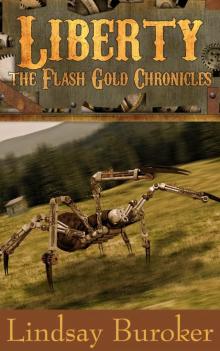 Liberty
Liberty The Fowl Proposal Bonus Scenes
The Fowl Proposal Bonus Scenes Forged in Blood I
Forged in Blood I Soulblade
Soulblade Perilous Hunt
Perilous Hunt 05 Dragon Blood: The Blade's Memory
05 Dragon Blood: The Blade's Memory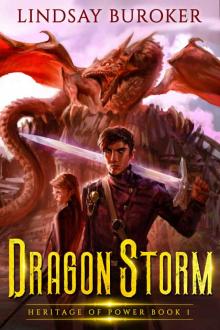 Dragon Storm
Dragon Storm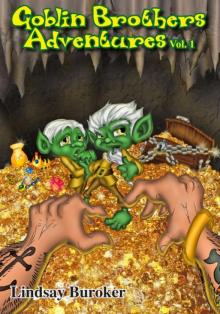 The Goblin Brothers Adventures
The Goblin Brothers Adventures Republic
Republic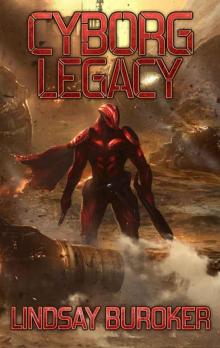 Cyborg Legacy
Cyborg Legacy Origins
Origins Beginnings: Five Heroic Fantasy Adventure Novels
Beginnings: Five Heroic Fantasy Adventure Novels Warrior Mage
Warrior Mage Swords and Salt - the Complete Series
Swords and Salt - the Complete Series 6.0 - Raptor
6.0 - Raptor Destiny Unchosen
Destiny Unchosen Balanced on the Blade's Edge
Balanced on the Blade's Edge Elven Doom (Death Before Dragons Book 4)
Elven Doom (Death Before Dragons Book 4)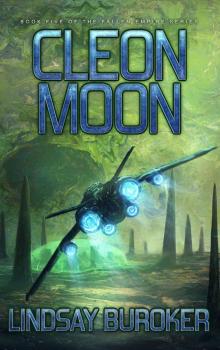 Cleon Moon
Cleon Moon Oaths (Dragon Blood, Book 8)
Oaths (Dragon Blood, Book 8) Crossfire (Star Kingdom Book 4)
Crossfire (Star Kingdom Book 4) Dragon Tear (Agents of the Crown Book 5)
Dragon Tear (Agents of the Crown Book 5)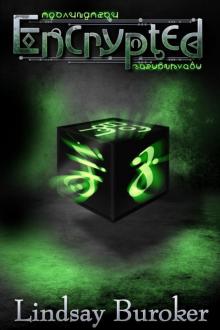 Encrypted
Encrypted Flash Gold
Flash Gold Enigma
Enigma_preview.jpg) Shadows Over Innocence (an Emperor's Edge short story)
Shadows Over Innocence (an Emperor's Edge short story) Decrypted
Decrypted Mist and Magic
Mist and Magic Starseers
Starseers Relic of Sorrows
Relic of Sorrows Blood and Betrayal
Blood and Betrayal Diplomats and Fugitives
Diplomats and Fugitives_preview.jpg) Balanced on the Blade's Edge (Dragon Blood, Book 1)
Balanced on the Blade's Edge (Dragon Blood, Book 1) The Emperor's Edge, no. 1
The Emperor's Edge, no. 1 Gold Dragon
Gold Dragon Duty Bound
Duty Bound Secrets of the Sword 2 (Death Before Dragons Book 8)
Secrets of the Sword 2 (Death Before Dragons Book 8) Peacemaker
Peacemaker Short Stories from the Star Kingdom
Short Stories from the Star Kingdom Shockwave
Shockwave Degrees of Delusion
Degrees of Delusion Assassin's Bond (Chains of Honor, Book 3)
Assassin's Bond (Chains of Honor, Book 3)_preview.jpg) The Emperor's Edge (a high fantasy mystery in an era of steam)
The Emperor's Edge (a high fantasy mystery in an era of steam)_preview.jpg) Solstice Day Gifts (an Emperor's Edge Short Story)
Solstice Day Gifts (an Emperor's Edge Short Story) Fractured Stars
Fractured Stars Honor's Flight
Honor's Flight Eye of Truth
Eye of Truth Arkadian Skies
Arkadian Skies Ship of Ruin
Ship of Ruin Unraveled
Unraveled Blood Ties
Blood Ties Great Chief
Great Chief End Game
End Game Conspiracy
Conspiracy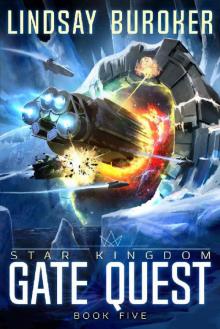 Gate Quest (Star Kingdom Book 5)
Gate Quest (Star Kingdom Book 5) Claimed
Claimed Under the Ice Blades
Under the Ice Blades Hero Code
Hero Code Battle Bond: An Urban Fantasy Dragon Series (Death Before Dragons Book 2)
Battle Bond: An Urban Fantasy Dragon Series (Death Before Dragons Book 2) Blood Charged
Blood Charged Angle of Truth
Angle of Truth Junkyard
Junkyard Agents of the Crown- The Complete Series
Agents of the Crown- The Complete Series Planet Killer (Star Kingdom Book 6)
Planet Killer (Star Kingdom Book 6) Shadows Over Innocence
Shadows Over Innocence Forged in Blood I ee-6
Forged in Blood I ee-6 Sinister Magic: An Urban Fantasy Dragon Series (Death Before Dragons Book 1)
Sinister Magic: An Urban Fantasy Dragon Series (Death Before Dragons Book 1) Blood and Betrayal (The Emperor's Edge Book 5)
Blood and Betrayal (The Emperor's Edge Book 5) Smuggler Ship
Smuggler Ship The Rogue Prince (Sky Full of Stars, Book 1)
The Rogue Prince (Sky Full of Stars, Book 1)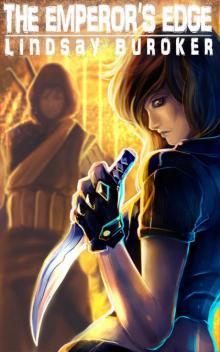 The Emperor's Edge (a high fantasy adventure in an era of steam)
The Emperor's Edge (a high fantasy adventure in an era of steam) Great Chief (Chains of Honor, Book 4)
Great Chief (Chains of Honor, Book 4) Hunted fgc-2
Hunted fgc-2 Shadows Over Innocence (emperor's edge)
Shadows Over Innocence (emperor's edge)![[Fallen Empire 00.5 - 03.0] Star Nomad Honor's Flight Starfall Station Starseers Last Command Read online](http://i1.bookreadfree.com/i/03/22/fallen_empire_00_5_-_03_0_star_nomad_hon_starfall_station_starseers_last_command_preview.jpg) [Fallen Empire 00.5 - 03.0] Star Nomad Honor's Flight Starfall Station Starseers Last Command
[Fallen Empire 00.5 - 03.0] Star Nomad Honor's Flight Starfall Station Starseers Last Command Arkadian Skies: Fallen Empire, Book 6
Arkadian Skies: Fallen Empire, Book 6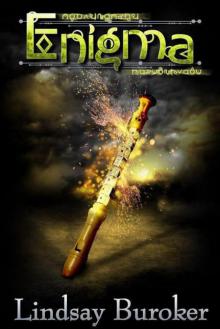 Enigma (emperor's edge)
Enigma (emperor's edge) Diplomats and Fugitives (The Emperor's Edge Book 9)
Diplomats and Fugitives (The Emperor's Edge Book 9)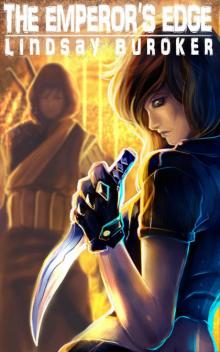 The Emperor's edge tee-1
The Emperor's edge tee-1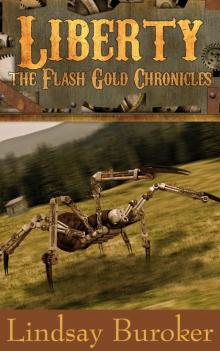 Liberty (Flash Gold, #5)
Liberty (Flash Gold, #5) Starseers: Fallen Empire, Book 3
Starseers: Fallen Empire, Book 3 Peacemaker fgc-3
Peacemaker fgc-3 Angle of Truth (Sky Full of Stars, Book 2)
Angle of Truth (Sky Full of Stars, Book 2) Perilous Hunt: Fallen Empire, Book 7
Perilous Hunt: Fallen Empire, Book 7 Ice Cracker II (emperor's edge)
Ice Cracker II (emperor's edge) Conspiracy (The Emperor's Edge Book 4)
Conspiracy (The Emperor's Edge Book 4) Decrypted (Encrypted #2)
Decrypted (Encrypted #2) Forgotten Ages (The Complete Series)
Forgotten Ages (The Complete Series) You Are Here: Tales of Cartographic Wonders
You Are Here: Tales of Cartographic Wonders Duty Bound (Agents of the Crown Book 3)
Duty Bound (Agents of the Crown Book 3) Snake Heart (Chains of Honor Book 2)
Snake Heart (Chains of Honor Book 2) Conspiracy ee-4
Conspiracy ee-4 Flash Gold fgc-1
Flash Gold fgc-1 Fallen Empire 1: Star Nomad
Fallen Empire 1: Star Nomad Claimed (The Flash Gold Chronicles, #4)
Claimed (The Flash Gold Chronicles, #4) Ice Cracker II (and other short stories) (The Emperor's Edge)
Ice Cracker II (and other short stories) (The Emperor's Edge) Fallen Empire 2: Honor's Flight
Fallen Empire 2: Honor's Flight Gold Dragon (Heritage of Power Book 5)
Gold Dragon (Heritage of Power Book 5)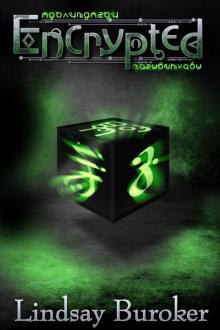 Encrypted (the emperor's edge)
Encrypted (the emperor's edge) Peacemaker (The Flash Gold Chronicles, #3)
Peacemaker (The Flash Gold Chronicles, #3) Patterns in the Dark (Dragon Blood Book 4)
Patterns in the Dark (Dragon Blood Book 4)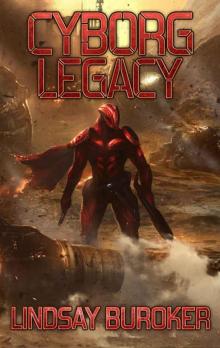 Cyborg Legacy: A Fallen Empire Novel
Cyborg Legacy: A Fallen Empire Novel The Swords & Salt Collection
The Swords & Salt Collection Blood and Betrayal ee-5
Blood and Betrayal ee-5 The assassin curse
The assassin curse Warrior Mage (Book 1)
Warrior Mage (Book 1) Forged in Blood II ee-7
Forged in Blood II ee-7 Relic of Sorrows: Fallen Empire, Book 4
Relic of Sorrows: Fallen Empire, Book 4 Deadly Games ee-3
Deadly Games ee-3 Elven Fury (Agents of the Crown Book 4)
Elven Fury (Agents of the Crown Book 4) Torrent rar-1
Torrent rar-1